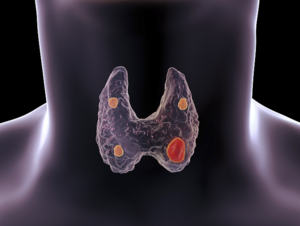How is parathyroid disease treated?


For the most common type of parathyroid disease, called primary hyperparathyroidism, the only treatment is an operation. During the operation, one or more diseased parathyroid glands are removed. Primary hyperparathyroidism is characterized by high calcium (generally over 10.0 mg/dl in adults over age 40, slightly higher for younger adults). If you have parathyroid disease with high calcium, then you likely have primary hyperparathyroidism and need an operation. This condition is most often caused by a benign tumor on one or two of the parathyroid glands. Removing those glands, and leaving the other normal glands behind, cures the disease.
Sometimes, all four parathyroid glands are diseased, and we need to remove three parathyroid glands and part of the fourth during the operation. We never want to remove all four parathyroid glands, because you do need some parathyroid hormone to keep your calcium in normal range.
There are no medications that cure primary hyperparathyroidism. There are medications that can help bring your calcium levels down if they are extremely high, but this is a temporary measure and should be followed up with surgery when possible.
You can read more about parathyroid surgery here: Parathyroid Surgery at the Southwest Parathyroid Center
Secondary hyperparathyroidism is a separate condition. It is characterized by chronically low calcium levels, which leads to overactive parathyroid glands. In this condition, the parathyroid glands are just trying to do their jobs - which is keep the calcium in normal range. If they cannot get the calcium up to normal range, they just keep making more and more parathyroid hormone (PTH). The treatment for this is calcium and Vitamin D supplementation to get the calcium level back in normal range. In most cases, the parathyroids will settle down once the calcium is back to normal. Most patients will not need an operation.
Secondary hyperparathyroidism can also be caused by kidney failure. Patients on dialysis will develop very high parathyroid hormone (PTH) levels. They are also treated with medications to control it, though frequently they will need an operation if the PTH is extremely high.



